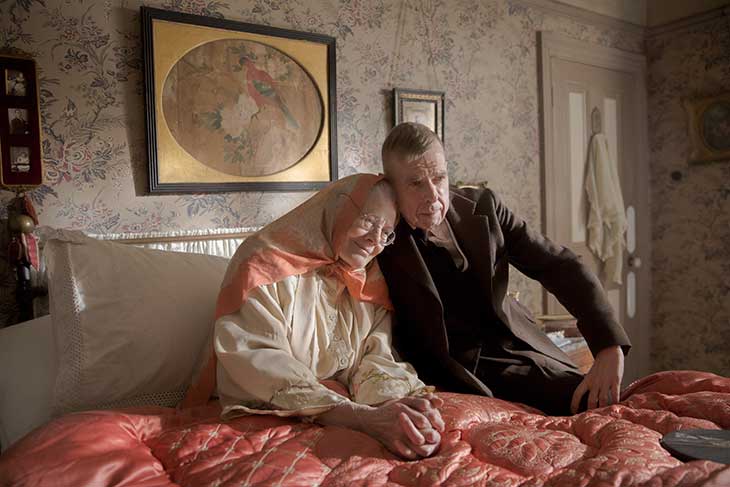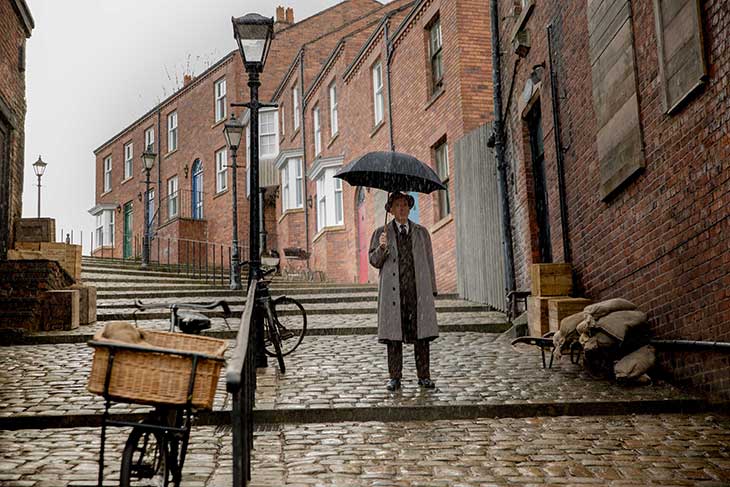In a wonderful BBC documentary from 1957, a bespectacled L.S. Lowry sits at his easel, one leg crossed over the other, his left hand in his pocket, while with his right he sketches black figures on a white canvas. A clock – one of a large collection in the house – chimes in the background. ‘I feel about critics,’ he says, ‘that they’re quite entitled to say what they think about a thing, and if one exhibits work in public or shows in public, one must accept what they say. […] If one’s afraid of criticism one ought not to show in public.’ That sentiment becomes more loaded, more plaintive even, when the artist (Timothy Spall) utters a similar line in the film Mrs Lowry and Son: ‘We don’t need an art critic to tell us what we like, do we mother?’ Alas, the difficult, perennially disappointed Mrs Lowry (Vanessa Redgrave) needs precisely that when it comes to her middle-aged son’s paintings. ‘Mr Denby is not impressed!’ she shrieks at him after reading an unfavourable review in the local newspaper. As an artist Lowry would always struggle to win over the critics, even when – perhaps especially when – he was at his most popular; but his mother, this film contends, was the fiercest critic of all.
There is, on reflection, something fitting about Timothy Spall stepping into the soggy Salford shoes of this particular artist, having already played J.M.W. Turner in Mike Leigh’s biopic of 2014. At the end of his career, Turner was recording, in suitably revolutionary style, the explosive dawn of British industry. Paintings such as Rain, Steam and Speed – The Great Western Railway (1844) encapsulated drama, movement, a sense of excitement and of progress. A century on, Lowry’s paintings of factories, smoking chimneys, the sprawling industrial towns of the north-west capture the twilight of that age, a world somewhat stultified by those decades of industry. Movement in his paintings is not dynamic but mechanical, his multiple figures resembling the very iron filings that Michael Faraday had experimented with in Turner’s day; the magnetic force in Lowry’s world is that which pulls workers through the factory gates to the sound of a bell.
Vanessa Redgrave and Timothy Spall in Mrs Lowry and Son (2019)

It’s 1934 in Lancashire, and the atmosphere is less George Formby and more Grim Up North. Rain lashes the grey streets from a grey sky, and Lowry, a rent collector by day, pitches himself against it like one of his ‘matchstick’ figures. Mrs Lowry finds all this grimness intolerable, even from her chintz-patterned bedroom, to which she keeps, cowering under a pink satin eiderdown, while her son attends to her every whim. ‘What kind of woman dreams of living in a two-up two-down in Pendlebury?’ she complains to him. Not her kind, that’s clear. She is a thwarted concert pianist, brought low – and to Pendlebury – from a smart Manchester suburb by her late husband’s debts. In an unwittingly painterly metaphor, she laments: ‘Life at the beginning had so much promise – a whiteness.’ Like one of her son’s canvases, which always began with a white ground, her life has gradually been peopled by what she considers the unsavoury, the ugly, the squalid – the working class.
Her obsession with gentility and her dissatisfaction with life make for some comic one-liners, brilliantly delivered by Redgrave (‘I haven’t been cheerful since 1868, the year of my confirmation’). But her son bears the brunt of it, and in this film at least, we’re witnessing an abusive relationship. If she really was this bad, you’re left marvelling that Lowry didn’t throttle his mother with a lace doily, let alone that he managed to continue painting – which he does, in the attic, at night – in spite of her cruel dismissal of his art. (‘Oh god, just shut up!’ one of my fellow cinemagoers shouted at her as she tells Lowry he’s not an artist, and never will be.)
Timothy Spall in Mrs Lowry and Son (2019)

Adrian Noble is primarily a theatre director, and this film, essentially a two-hander between Spall and Redgrave, has the feel of a stage production (from which it originated), which only serves to intensify the claustrophobia of the relationship between mother and son. Most of the action takes place in Mrs Lowry’s bedroom, where her son keeps her company in the evenings, and serves her meals. ‘You can’t go wrong with prunes and custard,’ she pronounces, in a rare moment of approval. (Cloying as custard, unfortunately, is the score by Craig Armstrong, which too often strays into Love Actually territory.)
I breathed an actual sigh of relief when one scene has Lowry taking his sketchbook up onto a moor outside town. The expanse! The freedom! From such excursions, and from his days trudging the streets collecting rents, he brings back titbits, slices of life witnessed that he hopes might amuse his mother. ‘I have no time for life’s deformities,’ comes her inevitable response. It takes an outsider, ‘a woman of quality’, to make Mrs Lowry reconsider one of her son’s paintings, Sailing Boats (1930). ‘I see what Mrs Stanhope sees,’ she tells him, wide-eyed. Her damascene conversion, and his pleasure in it, is painful to watch; it is also short-lived.
The irony and tragedy running through all this is, of course, compounded by our knowledge that Lowry’s paintings now sell for millions of pounds. His mother didn’t live to see his success: she died in 1939, the year he received his first one-man show in London. Like Turner after his father’s death, Lowry experienced a decline in his mental health after his mother died. ‘Every painting I did was for you,’ he tells her in the film, and that seems to have been at least partly true. L.S. Lowry holds the record for the greatest number of rejected British honours, and in 1968 he turned down a knighthood: there was no point in it, he felt, if his mother wasn’t there to see it.
Mrs Lowry and Son (2019) is on general release in the UK.



